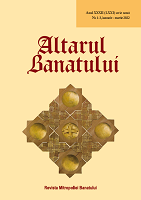IANCU DE HUNEDOARA, UN MARE APĂRĂTOR AL CREȘTINĂTĂȚII
JOHN HUNYADI, GREAT DEFENDER OF CHRISTIANITY
Author(s): Tiberiu CiobanuSubject(s): Christian Theology and Religion, Cultural history, 15th Century, Sociology of Religion, History of Religion
Published by: Mitropolia Banatului
Keywords: Middle Ages; Kingdom of Hungary; Byzantine Empire; Holy Roman Empire of German Nation; Ottoman Empire; High Gate; Turkish crescent moon; anti-Ottoman crusade; garrison; siege; “fire mouths”; warship;
Summary/Abstract: Because this year (more precisely on August 11th), the Romanian people, and not only, commemorate 565 years after the fall into immortality of John Hunyadi, as well as the fact that the great Romanian fighter in defence of Christianity meant a lot and to the history of the Banat (ancient Romanian province in which he mastered many and vast land possessions and not only [including the fortress-city of Timișoara and its surroundings] and which he governed for almost a decade and a half), I decided to dedicate this study to him, being honored that it would appear in the valuable magazine edited by the Metropolia of Banat. In the summer of 1456, John Hunyadi launched an appeal to the Christendom to prevent the Ottomans from taking Belgrade over. Turks considered it a fi rst major obstacle in their way towards the heart of Europe. Having John of Capestrano’s support (the Franciscan inquisitor of Hungary), Hunyadi raised an army of 27,000-28,000 voluntary fi ghters, in June 1456. These people of Transylvanian, Hungarian, Bohemian, Polish and German provenance came mostly from peasant families. Poorly armed with a rudimentary equippement and unskilled warriors, the simple, humble defenders of the Cross did their duty to the utmost, well-aware of the importance of the mission. At the same time they put their faith completely in their leader and that gave them more courage. The advancing Turkish galleys were forced to slow down by 200 ships launched at John’s indications. The Christian army was made up of about 48,000 soldiers. It comprised several detachments of volunteers, the Transylvanian fi ghters, the Bulgarian garrison and the troops which were embarked on the ships. A highly skilled commander, John Hunyadi, the leader of this army, drew up an ingenious plan to stop the Ottoman offensive. He placed the Southern borders of Transylvania under the care of the Wallachian future prince Vlad the Empaler. The hostilities started on 4 July 1456, when Sultan Mohammed II, the conquerer of Constantinopolis, arrived beneath the walls of the fortress of Belgrade. The besieged army led by Michael Szilágyi resisted heroically the enemy onslaugh for 10 days. The vigorous counterattack of the Belgradean garrison caused huge losses to the enemy forces forcing them to adopt more cautions tactics. Harrased by the fi ghting groups of the Hatzeg county knezes, the Turks were threatened by the spectrum of an inexorable disaster. On 14 July 1456 on the river Danube, at Salamkeman, the two enemy fl eets faced each other in an open confrontation and the Christians won. Breaking through the blockade imposed by the Ottomans and taking the control over the Danube, John Hunyadi sent supplies to the people of Belgrade and placed mobile reserves at west of the fortress, at the confl uence of the Sava and the Danube rivers. On 21 July 1456, the Ottomans attacked the fortress but the Christians struck back causing huge losses to the enemy. Rumours had it that women sided with men against the pagans. The decisive battle took place on 22 July and its most dramatic foments were when John Hunyadi took over the Turkish camp and seized their cannons. The Ottoman fi ghters left the battle-ground in panic abandoning a huge loot in the hands of the Christians. In the dramatic confrontation thousands pagans were killed, wounded or taken prisoners. The Padishah himself was hurt too. The survivors returned to their lands which belonged to the Sublime Portre. The Christians swept to victory due to the bravery and staunchness of the simple, humble people, the skills and the courage of all ranks officers and most of all, the strategic geniality and military experience of the great Romanian army commander. His fame was held in high esteem and such was the rejoicing of this victory, that all the church bells in Rome rang out together. The Pope Callixtus III bestowed upon John Hunyadi the title “the strongest athlete of Christ”.
Journal: Altarul Banatului
- Issue Year: XXXII/2021
- Issue No: 7-9
- Page Range: 79-101
- Page Count: 23
- Language: Romanian

